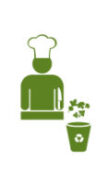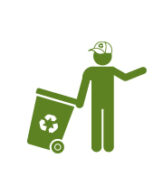UCRRA PARTNERS IN COMPOSTING PROGRAM
UCRRA operates a large scale industrial composting operation in Kingston, processing up to 5,000 tons of source-separated organics (food scraps) each year, transforming it into a high quality finished compost that’s sold to local farmers, landscapers, and hobby gardeners.
UCRRA partners with large food scrap generators such as; commercial businesses, cafés/restaurants, grocers, food manufacturers, office buildings, schools, hospitals/assisted living facilities, festivals/events, and local municipalities. Our partners work with our Recycling Outreach Team to develop and implement their composting plan, and it all starts with our New Partner Questionnaire to gather details about your location, the sources and quantity of food scraps, and your plans for how to educate participants. UCRRA provides free educational resources such as staff training/onboarding, bin stickers, sorting station posters, and much more! Our partners also have the option to sign-out 35 gallon rolling tote bins for use in the collection and transportation of the food scraps.
UCRRA does not provide any hauling or pick-up services. Our Partners must deliver the collected food scraps to our Organics Recovery Facility in Kingston, which requires a permit from the Ulster County Health Department, or arrange for services with a licensed food scrap hauler (refer to our list of haulers for more details). Contact our Director of Sustainability for a free consultation and a New Partner Questionnaire, and we can explain all of your composting options.
Let’s work together to Grow Ulster Green!
View our Partners in Composting Booklet
Food Scrap Drop Off Fee: $20.00 per ton
Accepting: all food scraps including pre or post consumer food scraps, meat/fish bones, dairy, fruit/vegetable trimmings, bulk produce, bread and bakery overages, coffee grounds/filters, tea bags, nut shells, cooked/uncooked foods, plate scrapings, etc.
Any inclusion of *fiber-based *BPI-certified compostable packaging (plates, cups) must be expressly reviewed and approved by UCRRA and may be discretionary based on the types, quantities, and frequency of drop off.
NOT Accepting: any type of PLA or resin-based “compostable” packaging such as cups/utensils/straws, bulk liquids, grease traps, waste vegetable oil, packaged foods, brewery waste grains, animal manure, food service contaminants (hairnets, gloves, condiment packages, rubber bands/twist ties, utensils, produce stickers, mesh produce bags, etc.), ay types of plastic, glass, metal, etc. pizza boxes or miscellaneous paper products.
Please note: contamination rates are charged at the current solid waste disposal fee.
UCRRA Named Small-Scale Compost Manufacturer of the Year by the U.S. Composting Council (2021)
RESOURCES
Organics Management for Businesses Resources by NYS Department of Environmental Conservation
Food Waste Estimator Tool by the NYS Pollution Prevention Institute
Contamination – A Troubleshooting Guide for Food Service Managers by the NYS Pollution Prevention Institute
Organic Resource Locator Tool by the NYS Pollution Prevention Institute
Rethink Food Waste NY – Free Technical Assistance by CET
Find a Food Scrap Hauler
Waste Reduction and Recycling Guidebook by UCRRA
TESTIMONIALS
“What an important time to embrace composting! Bread Alone Bakery has worked in partnership with UCRRA for almost five years. It is an initiative that is embraced by all company associates, as Bread Alone’s culture is one of sustainability and protecting all the Earth’s resources. Bakery ingredient overage is transported to UCRRA weekly to become part of their quality compose production. We are very fortunate to have UCRRA. The team there is passionate about their mission. If you haven’t visited their website, you should! I’d encourage a site visit as well, as you’ll learn an incredible amount of information that will foster your own personal sustainability initiatives above and beyond!”
-Paul Amos, Director of Operations/Food Safety Coordinator, Bread Alone Bakery
“We have loved working with UCRRA. They have made it so easy to [compost] in an efficient and easy way. We love their commitment to composting and recycling. It’s so important to keep food waste out of landfills and incinerators in order to decrease methane production and build healthy soils. The UCRRA gets all of this and they are a pleasure to work with!”
-Michelle & Java Bradley, Owners of JAVA’S COMPOST (New Jersey)
“The O Zone is a proud partner of Ulster County Resource Recovery Agency in their Composting Program. What an honor it is to work with such a professional, knowledgeable organization whose aim is to provide quality service and invaluable education to our community. Their diligent work is improving not only our community here in the Hudson Valley, but the world at large. Thank you for all that you do!”
– Amelia LeGare, Owner of The O Zone (Redhook NY)
“We have been sending food scraps to UCCRA’s Compost Facility since early 2017. UCRRA supports food scrap recycling as their primary goal. This motivation shows in all aspects of their operations and it’s been a pleasure working with UCRRA! They were one of the first composting facilities in the area, setting a model for others. Their operations are set up to support food scrap recycling programs, they accept the items needed for these programs to be successful. They set a low tip fee that promotes [composting] as a financial saving and they are a consistent and expanding facility to bring food scraps to.”
-Village of Scarsdale and Scarsdale Conservation Advisory Council (Westchester County)
WHY SHOULD YOU COMPOST?
WASTING FOOD WASTES EVERYTHING: When we waste food, we’re not only wasting money but we’re also wasting all the natural resources invested in producing and transporting that food. 19% of U.S. cropland, 18% of fertilizer use, and 21% of fresh water usage is dedicated to food that goes to waste each year.
LEAD BY EXAMPLE: Composting demonstrates your commitment to the environment and food donation demonstrates concern for social justice in equitable food systems. Society is becoming increasingly aware of sustainable climate change solutions, and consumers are looking to support businesses and organizations that have strong environmental sustainability goals.
IT’S THE LAW: The Ulster County Food Waste Prevention and Recovery Act goes into effect on January 1st 2021 and requires that large food scrap generators in Ulster County must donate all excess edible food and manage all remaining food scraps by organics recycling. Learn more here. State-wide, the New York State Food Donation and Food Scrap Recycling Law will go into effect on January 1st 2022, and has similar requirements.
POLLUTION PREVENTION: Food is natural organic material and when discarded in landfills, it degrades anaerobically to produce methane, a greenhouse gas more potent than carbon dioxide. Nationwide, food waste (food scraps) make up the largest component of material that gets buried in landfills – approximately 22% or over 30 million tons per year.
COMPOSTING IS RECYCLING’S NEXT FRONTIER: Forty percent of food grown in the U.S. is never eaten, a shocking statistic when you realize that almost 13% of New York State’s population is food insecure, more than 2.5 million New Yorkers. It’s estimated that as much as 30% of the waste stream is compostable. In Ulster County, that equates to about 30,000 tons of organics that could be diverted through composting.
REDUCE COSTS: Food waste makes up a significant portion of the municipal waste stream. For more businesses, schools, and institutions, 30-50% of waste could be avoided with better food handling and composting programs. Since facilities typically pay according to the volume of waste they generate, facilities can enjoy lower disposal costs by increasing recycling and composting activities.
CONNECTING COMMUNITIES THROUGH COMPOSTING
UCRRA Partners in Composting (English)
UCRRA Partners in Composting (Spanish)



